Santanu Kumar Acharya’s anthology “Drusya-Adrusya,” published in 2003, is a remarkable contribution to Odia literature. The book presents a unique blend of prose and poetry, skillfully weaving together themes of perception, reality, and the often-blurred lines that separate the two. Through its engaging narratives and rich characterizations, Acharya invites readers into a world where what is seen (drusya) and what is unseen (adrusya) tantalizingly intersect.
The title itself encapsulates the central theme of the collection—how our understanding of reality is largely influenced by our perceptions. Acharya delves into the intricate psyche of his characters, exploring their desires, dreams, and existential dilemmas. Each story in the compilation is a profound exploration of individual experiences against the backdrop of the larger socio-cultural reality. Through a blend of realism and metaphor, Acharya challenges readers to question their own perceptions of the world around them.
In one of the standout stories, “Chandra’s Shadow,” we follow the journey of a young artist grappling with self-doubt and the fear of inadequacy. The narrative artfully portrays the protagonist’s struggle between the societal expectations of success and his inner desire to create authentic art. Here, the author examines the theme of ‘adrusya’—the artistic vision and emotional landscapes that are often invisible to the outside world. As the artist navigates his internal conflict, readers are transported into the heart of his creative process, making us reflect on our silent battles and the unseen shadows we carry.
Another captivating story, “The Whispering Woods,” conveys a sense of mystique and enchantment. It recounts the tale of a group of friends who venture into a seemingly ordinary forest. As they journey deeper, they encounter surreal manifestations of their fears and fantasies, which serve as a metaphor for the hidden elements of their personalities. Acharya’s vivid imagery and poetic language breathe life into the setting, making the woods a character in itself. This narrative not only entertains but also serves as a mirror, reflecting the internal struggles each character faces, thus reinforcing the notion of ‘adrusya.’
What makes “Drusya-Adrusya” particularly compelling is its diversity in storytelling. Each sub-story introduces a unique perspective and emotional depth, allowing readers to journey through different layers of human experience. The prose flows seamlessly, creating a rhythmic cadence that enhances the overall reading experience. Acharya’s adeptness at character development is noteworthy; he crafts relatable, multi-dimensional characters that resonate with readers from various walks of life.
The compilation also demonstrates Acharya’s profound understanding of Odia culture, with subtle references to local traditions, folklore, and social issues, grounding his narratives in a rich historical context. This cultural resonance adds depth and relatability, making the stories not just enjoyable reads but also vehicles for reflection on personal and societal values.
In conclusion, “Drusya-Adrusya” stands as a testament to Santanu Kumar Acharya’s storytelling prowess and literary insight. It is a thought-provoking compilation that challenges readers to look beyond the surface, confronting the complexities of human existence and the invisible forces that shape our lives. The book is a must-read for anyone interested in exploring the intricate interplay between reality and perception, making it a significant addition to contemporary Odia literature. Whether you are a long-time lover of Odia literary works or a newcomer, “Drusya-Adrusya” promises to leave an indelible mark on your literary journey.
Books Info
| Books name | Drusya-Adrusya/ଦୃଶ୍ୟ ଅଦୃଶ୍ୟ |
| Editor | Santanu Kumar Acharya |
| No Of pages | 263 |
| Publisher | Grantha Mandira |
| Publication | 1962 |
| Printed At | Optima Offset Printers |
| Distributor | NA |

